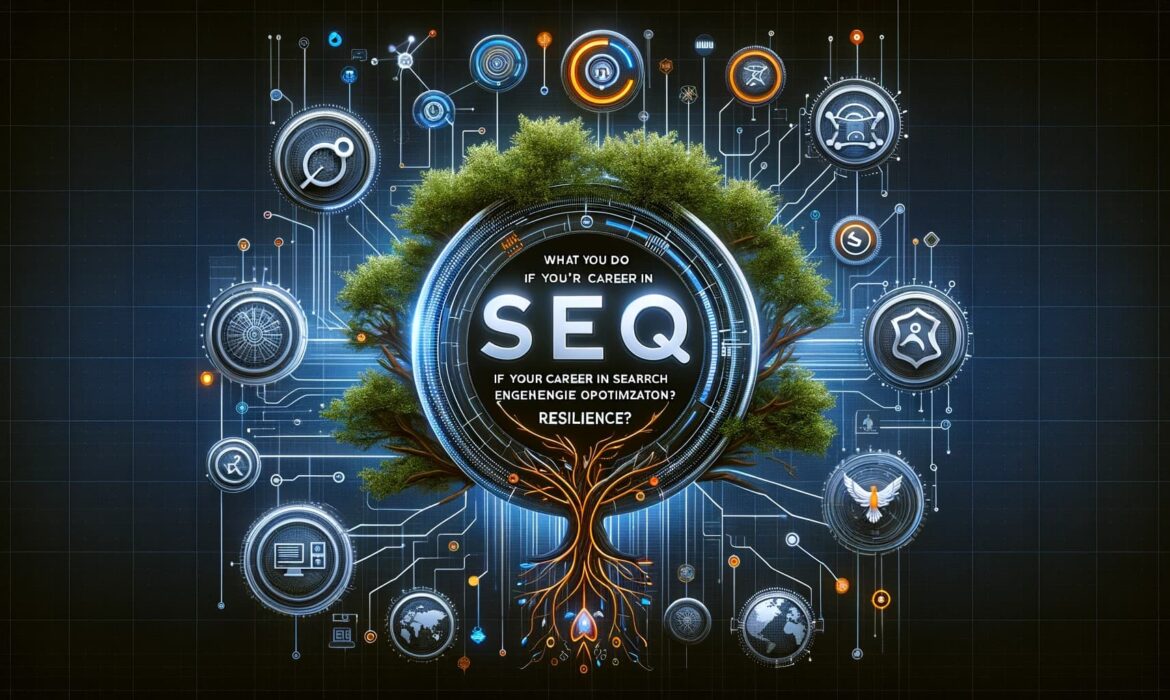Introduction

In the ever-evolving world of digital marketing, Search Engine Optimization (SEO) stands out as a dynamic and challenging frontier. This field is not just about understanding the algorithms that power Google, Bing, and other search engines but also about adapting to their continual changes. For SEO professionals, resilience isn’t just a beneficial trait—it’s a necessary one. As search engines refine their algorithms to deliver more accurate results, strategies that once drove traffic and success can suddenly become obsolete. The ability to quickly adapt, learn, and implement new tactics is pivotal.
This article delves deep into the essence of resilience in SEO. We’ll explore why embracing change, continuously learning, and strategically adapting are not just survival skills but pathways to thriving in this tumultuous field. From analyzing setbacks without assigning blame to building robust professional networks and maintaining a balance between proactive and reactive strategies, we’ll cover the comprehensive strategies that seasoned SEO experts employ to stay at the forefront of the industry. Join us as we unpack these themes, providing you with a roadmap to cultivate durability and flexibility in your SEO career.
Embrace Change
Understanding the Need for Change
In the realm of Search Engine Optimization, change is not just inevitable; it is the foundation upon which the industry is built. Search engines continually update their algorithms to enhance user experience and deliver the most relevant results. These changes can dramatically shift what works in SEO, sometimes overnight. For SEO professionals, staying static means falling behind. Embracing change is therefore essential, not only to maintain visibility in search engine results pages (SERPs) but also to capitalize on new opportunities that these updates often present.
Strategies for Embracing Change
To effectively embrace the dynamic nature of SEO, professionals can employ several strategic approaches:
- Stay Informed Through Industry Blogs, Forums, and Conferences: The first step in embracing change is awareness. Subscribing to top SEO blogs like Moz, Search Engine Journal, and Neil Patel, participating in forums such as Webmaster World or the Google Webmaster Forum, and attending key industry conferences will keep you on the cutting edge of what’s new and changing in SEO.
- Leverage Tools and Technologies That Monitor SEO Trends and Algorithm Updates: Utilizing tools such as Google Analytics, SEMrush, Ahrefs, and Moz can help detect shifts in SEO landscapes and understand their implications on your strategies. These tools offer insights into keyword shifts, backlink quality, and content performance, all of which are critical in adjusting strategies swiftly and efficiently.
By adopting these approaches, SEO professionals can transform the challenge of change into a strategic advantage. It’s not just about survival, but about using change as a stepping stone to new heights in your SEO career.
Continuous Learning
Importance of Keeping Updated
In the fast-paced world of Search Engine Optimization, staying updated is not merely beneficial—it’s imperative for maintaining a competitive edge. Continuous learning in SEO helps professionals not only keep up with the rapid developments in algorithms and market trends but also innovate and apply new strategies that can significantly enhance their search engine rankings and overall digital marketing effectiveness.
Methods for Continuous Learning
To stay ahead of the curve, SEO professionals can adopt the following learning strategies:
- Engaging with Online Courses, Webinars, and Workshops: Many institutions and industry leaders offer courses that range from the basics of SEO to advanced tactics. Platforms like Coursera, Udemy, and LinkedIn Learning are treasure troves of updated content. Regularly participating in webinars and workshops can also provide insights into industry changes and new techniques.
- Following Thought Leaders and Influencers in the SEO Community: Insights from industry pioneers can be invaluable. Following SEO experts such as Rand Fishkin, Barry Schwartz, and Danny Sullivan on social media and reading their publications can provide deep insights and prompt discussion on cutting-edge techniques and trends.
Analyze Setbacks
Assessing SEO Setbacks
When a well-planned SEO strategy fails to deliver, it is crucial to methodically evaluate what went wrong. This analysis involves a deep dive into analytics to understand the nuances of the setback, whether it’s a sudden drop in rankings, reduced traffic, or poor conversion rates. Methodical evaluation helps in pinpointing specific failures and creating a roadmap for recovery.
Learning from Mistakes
- Utilizing Tools for Analytics and Data Interpretation: Tools like Google Analytics, SEMrush, and Screaming Frog SEO Spider provide comprehensive data that helps in decoding the complexities of SEO performances. These tools offer insights into visitor behaviors, keyword performance, and competitor analysis, which are essential for understanding setbacks.
- Case Studies on Common SEO Setbacks and Tactics for Recovery: Learning from past mistakes—whether your own or those of others in the industry—can prevent future failures. Case studies focusing on SEO recovery after algorithm updates, technical failures, and strategic missteps provide practical lessons in resilience.
Build Networks
Benefits of Professional Networking
In the competitive field of SEO, building a robust professional network is more than just a career booster—it’s a crucial resource. A well-established network provides vital support, fosters knowledge exchange, and opens up opportunities for collaborations that can lead to significant advancements in your SEO strategies. Effective networking connects you to the pulse of the industry, keeping you informed and prepared for shifts that impact your work.
Tips for Effective Networking
- Engaging in SEO Forums and Online Communities: Participate actively in online platforms such as Reddit’s r/SEO, Stack Exchange’s Webmasters, or specific SEO groups on LinkedIn and Facebook. These communities are rich with discussions, advice, and updates, allowing for real-time engagement with other SEO professionals.
- Attending SEO and Digital Marketing Conferences: Conferences like MozCon, SMX, and Pubcon are not just learning opportunities—they are networking goldmines. They provide a platform to meet industry leaders and peers, discuss the latest trends and challenges, and connect with potential mentors or partners.
Practice Patience
The Long-Term Nature of SEO
SEO is inherently a long-term endeavor. Unlike paid advertising, the results from SEO build up over time and require patience, persistence, and consistent effort. Understanding this is crucial in setting realistic expectations for the outcomes of your SEO initiatives. Immediate results are rare, and SEO strategies need time to mature and yield measurable benefits.
Cultivating Patience
- Setting Realistic Timelines and Expectations with Clients and Stakeholders: It is vital to communicate clearly with clients about the timeline for SEO strategies to bear fruit. Educating them about the SEO process helps manage their expectations and underscores the value of patience in seeing effective results.
- Celebrating Small Victories to Maintain Motivation: Recognize and celebrate minor successes along the way, such as achieving a rank improvement for a key phrase, or a noticeable increase in organic traffic. These milestones are important for morale and can serve as motivational boosts for the team.
Adapt Strategically
Strategic Adaptation to Market Changes
In SEO, success depends not just on implementing best practices, but on dynamically integrating new trends and updates into existing strategies. Strategic adaptation involves foreseeing market shifts and preemptively adjusting tactics to leverage these changes, thereby securing a competitive edge.
Data-Driven Strategy Adjustments
- How to Use Analytics to Inform SEO Decisions: Utilizing analytics is critical for understanding the impact of changes and for making informed decisions. Tools like Google Analytics and Ahrefs provide valuable data on user behavior, traffic sources, and engagement metrics, which can guide your SEO strategy adjustments.
- Examples of Adapting Strategies in Response to Specific Algorithm Updates: For instance, when Google rolls out updates that prioritize mobile-first indexing, adapting your strategy to optimize for mobile users becomes imperative. Similarly, updates focusing on content quality mean revising and improving your website’s content to meet these new standards.
Here’s What Else to Consider
Incorporating Adjacent Skills
To truly excel in today’s SEO environment, expanding your skill set beyond traditional search engine optimization is essential. This includes:
- Content Marketing: Understanding how to create and distribute valuable, relevant, and consistent content to attract and retain a clearly defined audience.
- Social Media: Leveraging platforms like Facebook, Twitter, and LinkedIn to enhance brand presence and engage directly with consumers.
- Data Analysis: Developing the ability to interpret complex data sets to refine SEO strategies and provide more personalized content strategies.
Utilizing AI and Machine Learning
The incorporation of AI and machine learning in SEO opens up new avenues for automation and efficiency. These technologies can help:
- Enhance Personal Productivity: AI tools can automate repetitive tasks such as keyword research and data analysis, allowing SEO professionals to focus on strategy and creative elements.
- Improve SEO Strategies: Machine learning algorithms can predict trends and consumer behaviors, adapt content dynamically, and optimize SEO performance by analyzing vast amounts of data faster than ever before.
Embracing Technological Innovations

Adoption of New Tools
In the digital age, the adoption of advanced SEO tools and platforms is not just an advantage; it’s a necessity for staying ahead. Tools that harness AI and advanced analytics allow for a more nuanced understanding of search engine landscapes and consumer behavior, enabling SEO professionals to refine their strategies with high precision. These tools can automate mundane tasks, uncover insights from data that would otherwise be missed, and optimize both on-page and off-page elements effectively.
Leveraging AI for Predictive Analysis
AI’s capability for predictive analysis is transforming how SEO specialists anticipate market trends and user interactions. By analyzing past and current data, AI tools can forecast future changes in SEO landscapes, predict user behavior, and preemptively suggest adjustments to marketing strategies. This foresight allows businesses to always stay one step ahead, particularly in highly competitive markets.
Specialization vs. Diversification
Benefits of Specializing
Specializing in specific areas of SEO, such as local SEO, technical SEO, or e-commerce SEO, can significantly sharpen a practitioner’s profile. Deep expertise in a niche area allows for tailored strategies that are more effective and efficient than broad-spectrum approaches. This specialization can differentiate an SEO professional in a crowded market, providing a clear competitive edge by offering high-value expertise to specific client needs.
Advantages of Diversifying
Conversely, diversification in skills and knowledge areas can safeguard SEO professionals against market volatility and changing algorithm updates. A broad skill set enables flexible strategy adjustments and comprehensive digital marketing campaigns that integrate SEO with social media, content marketing, and data analysis. This holistic approach not only enhances the resilience of SEO strategies in fluctuating markets but also broadens the scope of potential client engagements and revenue opportunities.
Proactive vs. Reactive Approaches
Proactive Strategies
In the ever-changing landscape of SEO, adopting proactive strategies is key to staying ahead. This involves:
- Environmental Scanning: Regularly monitoring industry news and updates from key algorithm changes to emerging market trends.
- Continuous Learning and Skills Development: Staying updated with the latest tools, techniques, and certifications in SEO and related fields.
- Strategic Forecasting: Utilizing data analytics and AI tools to predict changes and potential opportunities in the SEO landscape.
By anticipating changes and preparing in advance, SEO professionals can implement strategies that not only withstand shocks but also exploit new opportunities that arise from these changes.
Reactive Adaptations
While proactive strategies are crucial, the ability to react swiftly to unexpected changes is equally important:
- Agility in Strategy Modification: Quickly altering existing SEO strategies in response to algorithm updates or shifts in user behavior.
- Crisis Management Protocols: Having predefined procedures for rapid response to major disruptions, such as penalties or hacks.
- Feedback Loops: Implementing systems to gather real-time performance data that can guide immediate adjustments.
Reactive agility ensures that SEO efforts are not derailed by unforeseen events, maintaining momentum and protecting investments.
Psychological Resilience in SEO
Coping with Stress and Anxiety
The high-pressure environment of SEO can often lead to stress and anxiety. Here are some strategies to manage these psychological challenges:
- Structured Decompression: Regular breaks and scheduled downtime can prevent burnout and maintain mental health.
- Mindfulness and Meditation: These practices can reduce stress levels and enhance overall well-being, improving focus and efficiency in professional tasks.
- Professional Support Networks: Engaging with peers for support and advice can alleviate feelings of isolation and stress.
Maintaining Work-Life Balance
Balancing the demands of a high-stakes SEO career with personal life is critical for long-term success:
- Effective Time Management: Prioritizing tasks and setting realistic deadlines to ensure professional demands do not overwhelm personal time.
- Setting Boundaries: Clear boundaries between work and personal life help prevent burnout and preserve relationships.
- Regular Self-Assessment: Periodically evaluating personal satisfaction and making adjustments to work habits can enhance both professional outcomes and personal well-being.
Advanced Analytical Techniques
Deep Dive into Analytics
To truly excel in SEO, professionals must go beyond surface-level metrics and embrace advanced analytical techniques. This involves:
- Enhanced Metric Analysis: Utilizing sophisticated analytics tools to delve into user engagement metrics, conversion paths, and behavior flow to identify underlying trends and anomalies.
- Predictive Analytics: Applying statistical models and forecast algorithms to predict future trends based on historical data.
- Segmentation and Personalization: Breaking down data into specific demographics to tailor SEO strategies that are uniquely effective across different audience segments.
Integrating SEO with Other Data Sources
Enhancing SEO strategies requires the integration of diverse data sources:
- CRM Systems: Merging CRM data with SEO data to refine customer personas and tailor content strategies that align more closely with customer needs.
- Customer Feedback Loops: Utilizing feedback to understand content effectiveness and user satisfaction, which can guide content refinement and optimization strategies.
- Cross-Platform Analytics: Combining insights from various digital platforms to create a comprehensive view of the SEO landscape and user behavior, improving the strategic decision-making process.
Legal and Ethical Considerations
Navigating SEO Ethics
Maintaining integrity and ethical standards is crucial in SEO. This includes:
- Avoiding Black-Hat Techniques: Steering clear of deceptive practices that can lead to penalties from search engines, including keyword stuffing and cloaking.
- Transparency with Clients: Being honest about strategies, potential risks, and realistic outcomes to build trust and credibility.
- Compliance with Search Engine Guidelines: Adhering to the guidelines set forth by search engines to ensure that SEO practices contribute positively to the ecosystem.
Legal Challenges
SEO practices must also navigate various legal landscapes, especially as they pertain to digital communication and data privacy:
- GDPR Compliance: For businesses targeting European audiences, adhering to GDPR by implementing stringent data protection and privacy measures.
- Data Usage and Privacy Policies: Ensuring that all SEO activities involving data collection and analysis are compliant with local and international laws to avoid legal repercussions.
- Copyright and Content Compliance: Respecting intellectual property rights and sourcing content ethically to prevent legal issues related to copyright infringement.
Fostering a Resilient SEO Culture
Fostering a Culture of Innovation
Creating a workplace that thrives on change and encourages innovation is vital for sustaining success in the volatile field of SEO. Here’s how companies can cultivate such a culture:
- Encourage Experimentation: Allow team members to try new ideas, test different strategies, and learn from successes and failures without fear of retribution.
- Promote Continuous Learning: Invest in training and development resources that keep staff up-to-date with the latest SEO tools, trends, and practices.
- Reward Creative Thinking: Recognize and reward creativity and problem-solving within the team, reinforcing a culture that values innovation.
Building Team Resilience
Developing a resilient team is essential for adapting and thriving in the ever-changing SEO landscape:
- Cross-Functional Training: Equip team members with skills across different SEO and digital marketing aspects to enhance flexibility and team adaptability.
- Open Lines of Communication: Foster an environment where team members can share ideas, concerns, and feedback openly and without judgment.
- Supportive Leadership: Leaders should act as role models in resilience, demonstrating commitment to the team’s growth and well-being, and preparing them to handle industry changes and challenges.
Longitudinal Case Studies
Success Stories Over the Years
Examining longitudinal case studies offers invaluable insights into how businesses can navigate major SEO upheavals successfully. These narratives highlight the strategies that endured and underscore the agility needed to adapt to unexpected changes. For example, a detailed review of a retail giant may reveal how they’ve adapted their SEO strategies to various Google algorithm updates over the years, maintaining a strong online presence throughout.
Lessons Learned
Long-term data from these case studies elucidates several critical lessons:
- Importance of Adaptation: Continuous adaptation to SEO strategies based on analytical insights and industry trends is crucial.
- Longevity of Best Practices: Despite constant changes, certain SEO best practices remain relevant and continue to provide results.
- Strategic Flexibility: The ability to pivot strategies quickly in response to algorithm updates has proven essential for sustained SEO success.
Case Studies and Real-World Examples
Success Through Resilience: How Top SEO Professionals Stay Ahead
The journeys of industry experts like Maulik Kotak, Praveen Kumar, and Swapnil Rajput provide actionable insights into the art of resilience in SEO.
- Maulik Kotak: As a Digital Marketing Consultant renowned for driving substantial ROI through SEO, Maulik has consistently adapted to the evolving digital landscape. By focusing on data-driven strategies and embracing every Google algorithm change as an opportunity, Maulik has helped numerous businesses turn challenges into triumphs.
- Praveen Kumar: Known as a top voice in organic search, Praveen’s approach involves a combination of continual learning and strategic foresight. His career showcases how adapting ahead of changes and integrating new methodologies like AI and machine learning into SEO practices can sustain and enhance organic growth.
- Swapnil Rajput: As an SEO Manager specializing in technical aspects from schema to core web vitals, Swapnil’s success underscores the importance of technical excellence and proactive adaptations in SEO. His effective response to updates in search engine algorithms through innovative technical strategies has set a benchmark in the industry.
Analysis of Resilience in SEO Careers
These professionals demonstrate that resilience in SEO doesn’t merely mean surviving; it means thriving. They have shown how embracing innovation, leveraging new tools, and anticipating market shifts can significantly amplify success. Their careers are a testament to the power of resilience in navigating the complexities of SEO.
Call to Action

Join Our Community of Resilient SEO Professionals
- Share Your Experiences: Have you faced challenges in your SEO journey? Have you discovered strategies that have helped you overcome them? Share your stories and learn from peers in our vibrant community.
- Stay Updated: Sign up for our newsletter to receive the latest updates on SEO trends and resilience strategies directly to your inbox. Keep ahead of industry changes and ensure your SEO efforts are both innovative and effective.
Conclusion
Throughout this exploration of resilience in SEO, we’ve navigated through the imperative of embracing change, the necessity for continuous learning, the strategies for analyzing setbacks, and the benefits of building robust professional networks. We’ve also delved into the virtues of patience, the advantages of both proactive and reactive approaches, and the importance of integrating advanced analytical techniques and diverse data sources to refine SEO practices.
Our journey highlighted the dual paths of specializing to develop deep expertise and diversifying skills to adapt flexibly to the SEO landscape’s demands. We discussed the technological advancements that are shaping the future of SEO and underscored the ethical and legal standards that safeguard its practice.
The case studies of seasoned experts like Maulik Kotak, Praveen Kumar, and Swapnil Rajput illustrated that resilience is not just about enduring but about thriving—turning potential obstacles into opportunities for growth and innovation. Their stories are a testament to the power of resilience in fostering a successful SEO career.
As the digital world continues to evolve, the ability to adapt and respond with resilience not only determines success but also defines sustainability in the competitive field of SEO. Challenges should be viewed not as barriers but as invitations to innovate and drive the field forward.
Embrace these challenges, armed with the strategies discussed, and continue to push the boundaries of what is possible in SEO. Whether you’re refining your tactics in response to algorithm updates or exploring new horizons with AI and machine learning, remember: that in the dynamic world of SEO, resilience is your most valuable asset.




